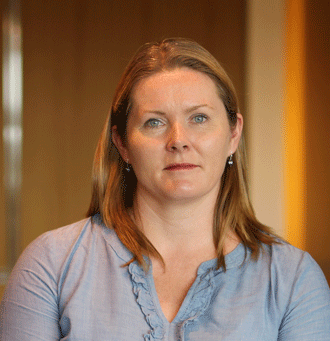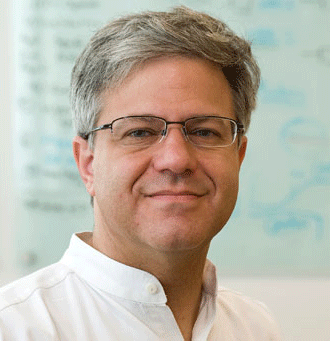 |
|
| Katherine Fitzgerald, PhD | |
 |
|
| Phillip Zamore, PhD |
Two prominent researchers at UMass Medical School have received Method to Extend Research in Time (MERIT) awards from the National Institutes of Health for their ability to demonstrate “superior competence and productivity during their previous endeavors” and for being “likely to continue to perform in an outstanding manner in the future,” according to the NIH.
Katherine A. Fitzgerald, PhD, professor of medicine, and Phillip D. Zamore, PhD, Howard Hughes Medical Institute Investigator; the Gretchen Stone Cook Chair of Biomedical Sciences; professor of biochemistry & molecular pharmacology; and co-director of the RNA Therapeutics Institute, received the grants from the National Institute of Allergy and Infectious Diseases and the National Institute of General Medical Sciences, respectively.
This is the second MERIT award for Dr. Zamore, who is credited with identifying the biochemical machinery responsible for RNA silencing, the mechanism through which small pieces of genetic material can turn specific genes on or off. Among his many discoveries, he showed how short segments of RNA act as guides during the silencing process, ensuring that the targeted gene is silenced. Under the current NIH grant extension, Zamore will again receive nearly $3 million during a five-year period to continue his work, which focuses on argonaute proteins and RNA silencing pathways.
“Dr. Zamore has the ability to recognize the next key challenge in his field of noncoding RNAs, devise clean, insightful experiments and publish his ground-breaking results in the most competitive journals,” said C. Robert Matthews, PhD, the Arthur F. and Helen P. Koskinas Professor of Biochemistry & Molecular Pharmacology and chair and professor of biochemistry & molecular pharmacology.
“As a chemist, I never cease to be amazed at the mechanistic information that he can derive from polyacrylamide gels. He complements his scientific acumen with a passion for mentoring his students and our GSBS students at large. In particular, his role as the co-PI on our BEST grant from the NIH is a definitive statement about his commitment to insuring that all receive the professional development that they need to attain their career goals,” Dr. Matthews said.
Dr. Fitzgerald will receive approximately $2 million during a five-year period to continue her research into gene regulation in innate immunity. Fitzgerald is a leader in immunology for her work to unravel the molecular basis of host defense and the inflammatory process.
The Fitzgerald lab focuses on uncovering the molecular basis of host defense and the inflammatory process with the ultimate goal of understanding how dysregulation of sensing, signaling and gene regulation in innate immunity underlie the pathogenesis of infectious, inflammatory and autoimmune disease in humans. Using an interdisciplinary approach and a highly collaborative style, she has made numerous novel discoveries including the identification of Toll-like receptor adapter molecules and uncovering new evidence for the importance of regulatory long-coding RNAs in innate immune cells.
“Dr. Fitzgerald has been a major figure in understanding the generation and regulation of interferon, a key component in the host response to infection. She is internationally known for her contributions to the field of innate immunity—the way that the body responds to infection and inflammation. As a major thought-leader in the area of regulation of inflammation and immunity, she deserves this important recognition from the NIH,” said Robert Finberg, MD, the Richard M. Haidack Professor of Medicine and chair and professor of medicine.
Fitzgerald and Zamore join a growing list of UMMS researchers who have received MERIT awards, including:
- Vivian Budnik, PhD, chair and professor of neurobiology
- Michael P. Czech, PhD, the Isadore and Fanny Foxman Chair in Medical Research, chair and professor of molecular medicine
- Robert J. Goldberg, PhD, professor of quantitative health sciences
- Douglas T. Golenbock, MD, professor of medicine
- Heinrich Gottlinger, MD, PhD, professor of molecular, cell & cancer biology
- Allan S. Jacobson, PhD, the Gerald L. Haidak, MD, and Zelda S. Haidak Professor of Cell Biology andchair and professor of microbiology & physiological systems
- Craig L. Peterson, PhD, professor of molecular medicine
- Peter A. Rice, MD, professor of medicine
- Joel Richter, PhD, professor of molecular medicine
- Lawrence Stern, PhD, professor of pathology
- Susan Swain, PhD, professor of pathology
- Gyongyi Szabo, MD, PhD, professor of medicine
- Raymond M. Welsh, PhD, professor of pathology
- George B. Witman, PhD, the George F. Booth Chair in the Basic Sciences and professor of cell & developmental biology